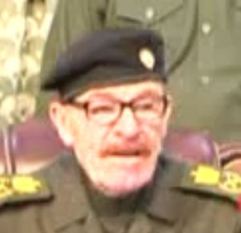الصدمه المدويه التي احدثها خطاب الرئيس عزت ابراهيم الدوري (حفظه الله)
لقد جعل الاعداء والعملا يتخبطون منذهلين من هول الصدمه ليس لما احتواه الخطاب الهام فقط , ولكن للشكل والهيبه والثقه التي بداء فيها حفظه الله , ,والبشرى بالنصر و تعزيز الثقه بالمقاومه لدى المقاومين والمناضلين العرب......
هنا انقل لكم احدى المقالات التي نشرت بالغه الانجليزيه
هنا انقل لكم احدى المقالات التي نشرت بالغه الانجليزيه
Where Is Izzat al-Duri?
The sensational video of Izzat al-Duri released yesterday on the occasion of the 65 year anniversary of the Baath party isn’t getting quite the airplay it deserves. Not that the content of the hour-long speech in itself is particularly interesting, but the sheer fact that, despite rumours of ill health, the most senior Baath leader to survive the Iraq War is confirmed to be alive and well is an important development. This is, after all, the person seen as the rightful successor to Saddam Hussein by the remaining Baath party faithful. Additionally, towards the end of the speech, Duri reveals some interesting perspectives on the broader regional situation that provide clues as to this possible whereabouts, which for a long time has been something of a riddle.
First of all: It looks real. Duri has a characteristic appearance and does not easily lend himself to impersonation. Even though the Baath party specialized in this kind of thing, it seems unlikely that this video is the work of a double.
Above, screenshot of Duri in video released yesterday; below, archive photo
The Iraq-related part of the speech takes up most bandwidth and is the least interesting one. It is a predictable outpouring of anger concerning supposed Iranian influences penetrating everywhere in Iraq and spreading across the Arab world. Not only that, Duri repeatedly describes this as a conspiracy of Persians/Safavids, Americans and Israeli Zionists. Perhaps the most interesting aspect here is that Duri – at 70 and despite conflicting stories about his health situation – had the stamina to gesticulate his way through an hour of these grand theories.
The more interesting and newsworthy parts of the Duri speech are towards the very end. Here, he comments on broader regional developments, including the situation in Libya, Syria and Yemen.
Regarding Libya, Duri clearly sees developments there as a deplorable parallel to what took place in Iraq in terms of “foreign intervention”. With respect to Syria, there is praise for the “legitimate” and “peaceful uprising” of the Syrian people, though there seems to be concern that foreign (Western) intervention can ensue if things get out of hand. Most remarkably, though, there is much praise for the Saudi king with reference to his efforts to help solve the situation in Yemen.
Beyond verifying the relative recency of the video, these remarks help explain the worldview of Duri, which seems to be one in which Iranian and Western interventions in the Arab world must be fought at any cost. Unsurprisingly, given his own religious background, there is more positive praise for the ulama in the Arab world than one would perhaps expect from a Baathist leader, even after a decade of state-led “Islamism” in Iraq in the 1990s.
Above all, though, Duri’s remarks on the regional situation may help address that lingering question of where he currently lives. For a long time, it was thought he was in Syria, but the praise for the Syrian uprising suggests he is not there anymore. That leaves the Gulf states as his most likely current location. Given the criticism of the Libya intervention, Qatar can probably be ruled out. On the other hand, the praise for the Saudi king seems to be a credible indicator that he might be there already or is applying for a permanent residence permit.
For many years after 2003, the Iraqi Baathist presence in Syria served as something of an anomaly for those seeing grand sectarian schemes and a Shiite axis projecting through the region from Iran via Iraq to Syria and Lebanon. The realignment of Duri and the Iraqi Baath towards the conservative Gulf monarchies makes both themselves and the Syrian regime – now deprived of another Sunni-secular card – look a little more sectarian than before. The more sectarian Shiite media outlets in Iraq will lose no time in seizing on this; as ever, though, the question is whether the majority of Iraqis will allow hyperbole articulated from outside the country to aggravate their own political problems.


ليست هناك تعليقات:
إرسال تعليق